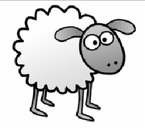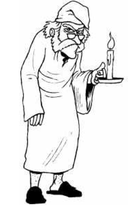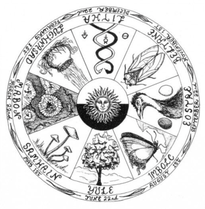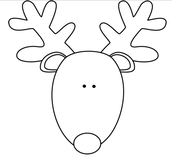 The Urban Dictionary defines sheeple as people who follow trends mindlessly. Instead of trends, I mindlessly follow word histories. I refer to this practice as etymosheepling. Here’s an example: I randomly land on the word genuine, meaning natural or not acquired. It arrived in English in the 1590s, its Latin root being gignere, meaning beget. Genuine’s etymological notes suggest that its form (ending in –ine) may have been influenced through contrast to adulterinus, which meant spurious or false. Adulterinus? It must be associated with adultery, but is it associated with adult? Etymosheepling rules lead me to look up adultery & adult. Adultery is related to adulterate, both words coming from the Latin word adulterare, to corrupt. Adult – on the other hand – came from the Latin adultus, meaning grown up, mature, adult or ripe. Adult came into English in the 1530s. The etymological notes under adult explain – and I can’t believe I never imagined the connection – that adultus is the past participle of adolescere, to grow up, mature, or be nourished. This means that the root words for adolescent & adult reflect the same sort of growth reflected by in-the-flesh adolescents as they change to adults. That would lead me to…WAIT! I could go all night. I love this stuff. A good game of Etymosheeple can be endless. With that in mind, we’ll call this round one, with plans of continuing next week. Please join in the game, suggest in the comments section a thread we might follow from the final etymology or definition above. My thanks go out to this week’s sources: the OED, Wordnik, The Urban Dictionary, & Etymonline.
1 Comment
 When trying to reach a goal, whether New Year’s resolution or otherwise, what works best for you? Coercing or compelling yourself? Promising, encouraging or goading yourself? Or maybe wishing? Do any of these words’ etymologies throw light on who you are or how you reach your goals? The word wish came from the Old English word wyscan, meaning to strive after, wish, desire, or be satisfied. To coerce is to control or restrain, & appeared in English in the 1400s from the French word cohercer. It most likely came from a Proto-Indo-European word meaning to hold, contain or guard. Compel comes from the Old French word compeller, which was derived from a Latin word meaning to drive together, to force. The noun promise showed up in the 1400s, meaning declaration made about the future, about some act to be done or not done. The verb showed up within a century, meaning to send forth or foretell. Encourage came to English in the 1400s from the French word encoragier, meaning to make strong or to hearten – it’s related to the word courage. The verb goad came from the Old English noun gad, meaning point, spearhead or arrowhead, When it comes to resolutions, I find it fascinating that since the 1400s the first meaning of the word resolution has been a breaking into parts. Doesn’t our success in reaching some big goal almost always involve exactly that? No significant success is simple. By the 1540s, resolution’s adjectival sibling resolute picked up the meaning holding firmly. What verb above helps you hold firmly to your goals or resolutions? Striving? Containment? Force? Foretelling? Poking yourself with a spearhead? Are there other verbs I left out? Please let me know in the comments section. My thanks go out to this week’s sources, Collins Dictionary, The OED & Etymonline.  This week, we’ll look at huff, then consider a few more words of imitative origin that refer to something annoying. Huff made its way into English in the mid-1400s, as an imitation of an exhalation. By the 1590s huff picked up the meaning bluster with indignation. The idiom to leave in a huff, showed up in 1778. In 1727 the word tiff came to English, meaning an outburst of temper, also based on the imitative sound of an exhalation, or slight puff of air. By 1754 tiff picked up the meaning, a small quarrel. Another word imitating a puff of air is guff, which arrived in 1825. By 1888 it picked up its modern meaning, empty talk or nonsense, as in that’s a lot of guff. In 1765, ugh showed up, imitating another sort of exhalation, a cough. By 1837 ugh morphed to become an interjection of disgust. Squib, a short piece of sarcastic writing, showed up in English in the 1520s. Though etymologists haven’t determined that it has its origin in the firework of the same name, if it indeed does, then it is imitative of the sound of that particular firework, which hisses (as might the unfortunate targets of sarcastic writing). In the 1620s, the imitative word squelch was born. It meant to fall, drop or stomp on something soft with a crushing force (imagine the sound of collapsing onto a sofa fashioned of marshmallow crème). Squelch picked up a second meaning in 1764, to suppress completely. The final imitative annoyance for this post took me by complete surprise. The Sanskrit word mu referred to a gnat or fly, & was imitative of the sound of such insects. In time, mu made its way into Latin, where it became the noun, musca, fly. By the time it reached English, it referred to a particularly annoying little fly, so it picked up a diminutive ending to become mosquito. It’s enough to make one exhale a puff of air, isn’t it? So, did anyone out there already know that mosquito is imitative in origin? Or that nearly all these words relate to a n exhalation? Come on, fess up. My thanks go out to this week’s sources: Collins Dictionary, the OED, Wordnik & Etymonline.  Humbug & countless words in the language come from who-knows-where. And it seems many of them have to do with the actions of difficult people. Here are a few words that fit in both categories. Humbug, meaning trick, jest, hoax or deception, appeared in English in the 1750s & became instantly popular – nearly as popular as the numerous wild theories as to humbug’s origin. It continues to vex etymologists, as the puzzle remains unanswered, though speculation has been going on since the word’s arrival in the language, The verb, to carp, entered English in the early 1200s probably from an Old Norse word meaning to brag. Though its present meaning may have been influenced centuries ago by the Latin word carpere, to slander, this hasn’t been proven just yet, so our modern verb carp is officially of unknown origin. Another verb to crab, meaning to vex or irritate, showed up in English in the 1400s. Though it may have its roots in the Swedish word scrab, meaning bad-tempered, the origin of scrab is a mystery to etymologists. The verb, to beef, showed up in the 1880s, meaning to complain, from the noun beef, meaning a complaint, which appeared in that same decade. Though the hypothesis has been floated that both these meanings stem from soldiers lodging complaints about the quality of the beef they were served, it remains a hypothesis, & nobody knows for sure. Tantrum entered the language in 1714. Its source is almost universally considered unknown, though a contributor at English Language & Usage suggests possible connections to the prankish capering involved in something called the tarantula dance. This same contributor also dug up a 1675 usage (not recognized in most etymological sources) in which tantrum clearly refers to the male organ. All this goes to prove that day and night, hard-working etymologists are mining the circuitous & oddly fascinating depths of word history. What other words do we use to describe the actions or nature of difficult people? Leave some suggestions in the comments section. My thanks go out to this week’s sources the OED, English Language & Usage, & Etymonline.  Since the holidays usually involve a lot of food and a bit of a mess, here we go. The word mess comes from the Latin word, mittere, to send away or put, & simply suggests that someone has put the food on the table. It appeared in our language in the late 1300s. Interestingly, mass in the religious sense comes from the same source. So, the word mess isn’t really a mess at all, but these food words are: Hash comes from the French word hacher, to hack or chop into small pieces. It entered English in the 1660s.The French word came from the Old French word for ax, hache. It doesn’t take much imagination to see that hash & hatchet are related. Here’s hoping nobody’s hash was hacked or chopped into small pieceswith a hatchet (a messy process at best). By 1735, hash acquired the more generalized meaning, a mix or mess. Shambles showed up in English in the late 1400s, meaning meat or fish market, and came from the Old English word scomul (orscaemul), meaning stool or table for vending. By the 1540s, shambles meant slaughterhouse. This meaning became generalized by 1590 to mean place of butchery, & it wasn’t until 1901 that the meaning of shambles became generalized enough to mean confusion or mess. Hodgepodge entered English in the late 1300s as hotchpotch, a kind of stew. It appears that the word is a hodgepodge itself, the first bit coming from Old French, meaning to shake, and the second part coming from German, probably derived from Late Latin, meaning cooking vessel (related to our modern day cooking vessel, the pot). Though multiple sources list possible ingredients for this kind of stew, each source seems to provide a different list. It seems for a few centuries, whatever one shook into the pot on the British Isles gave cause to refer to the meal as hodgepodge. In 1894 a variant of bologna was born – baloney! The term referred to a sausage made of odds & ends. By 1922, possibly through association with the term blarney, baloney came to mean nonsense, which isn’t quite a synonym for mess, though one could argue that the odds & ends that went into bologna/baloney might qualify as such. Anyone who has ever bussed a table or eaten in the vicinity of a two-year old is familiar with the equation food = mess. Might these etymologies simply reflect that reality? My thanks go out to this week’s sources the OED, Hugh Rawson’s Devious Derivations (Castle Books, 2002), Wordnik & Etymonline.  The word(s) Christmas showed up in Old English in 1123 as Cristes mæsse. It’s no surprise that the first bit heralds from the word Christ, while the second comes from the celebration of mass. More intriguing to me are the arrival dates of the following: Father Christmas, late 1400s Christmas box, 1611 Christmastide 1620 Christmas tree 1835 Christmas card 1843 Xmas, which I’ve always assumed is a tacky invention of modern Americans, actually showed up in 1551 in England, the X coming from the first letter of Christos in Greek. Before that, examples of Xrmas (beginning with the first two letters of Christos in Greek) occurred as early as 1100. It turns out we tacky Americans don’t hold responsibility for this one. That 1551 citing comes from the arguably erudite E. Lodge, British historian. And who knew that yule & jolly are kissing cousins? Both appear to come from a pre-Christian winter feast known in Old Norse as jol. Jolly showed up in English in 1300 after jol made its way through French, becoming jolif, meaning festive, pretty, merry, or amorous, whereas yule (also born of jol) made its way through the Old English word geola, which meant Christmas day or Christmastide. Here’s hoping those amorous Old Norsefolk who gave us these words experienced many a jolly jol in doing so. Please leave a comment, & whether you celebrate Christmas or some other wintry holiday with friends, with family, or all by your lonesome, may your Christmas mass, your time around the Yule log, or your general jolliness be downright glorious. My thanks go out to this week’s sources The OED, Collins Dictionary, Ginger Williams (image) & Etymonline.  As the holidays approach, we're all more likely than usual to be indulging in favorite dishes. So here's a look into the word dish. Dish occupies about one full page of the print version of the Oxford English Dictionary. Dish first appeared in Old English as early as 700 AD, meaning disk, plate or table. The disk or plate meaning came from Vulgar Latin, while the table meaning came through an early Italian or French dialect. By the mid-1400s dish could refer to a type of food served, as in “Elton brought the most peculiar dish to Gliselda’s holiday bash.” Around that same time the verb form appeared, meaning to serve food. We see vestiges of this form in the modern idiom to dish up. By the 1940s, the idiom dish it out was born, meaning to administer punishment. Somewhere around 1900 the noun dish picked up the meaning what one likes, as in “Who would’ve guessed that juggling live squid would become little Balthazar’s dish?” By 1920 the noun dish acquired the meaning attractive woman, as in “That Myrtle Mae is one serious dish!” About this same time the adjective dishy was born, applying to both male and female attractiveness. And in 1978 the term satellite dish was born. Dish’s closest relations include disk, disc, discus, dais & desk. Some additional dish idioms include: To dish on someone To do the dishes To dish the dirt Revenge is a dish best served cold Some lost meanings for dish include: A specific measure of corn In tin-mining, a gallon of ore ready for smelting In the game of quoits, a quoit To cheat, defeat completely or circumvent In celebration of one of the many meanings of dish, please leave a note in the comments section regarding a favorite family dish of the edible variety). My thanks go out to this week’s sources: the OED, Wordnik, Merriam Webster, & Etymonline. This year, folks will celebrate Chanukkah December 22 to December 30, so in preparation, let’s take an etymological glance at Chanukkah & a few Chanukkah-related words that have made their way into English.
I’ll start by noting that the spellings I’ve chosen for this post are those favored by Balashon– the Hebrew Language Detective. Do others prefer other spellings? Yes. Any time English steals from elsewhere (which is most of the time), spellings get funky. There you go. Not surprisingly, Chanukkah, means consecration. It entered English at the late date of 1891 (linguistic anti Semitism at work, perchance?). Interestingly, Chanukkah was the proper name of Cain’s oldest son, the father of Methusaleh. Menorah entered English about the same time (1886), meaning candlestick, from a Semitic term meaning to shine or give light. This word came from the Arabic word manarah or manarat, meaning fire. The word minaret comes from the same root, which means there’s hardly an etymological degree of separation between minarets all over the world, from which Muslims are called to prayer, & the countless menorahs lit for Chanukkah. Dreidel comes to English through Yiddish, & came to Yiddish through German. Dreidel's German root drehen means to spin. Its relatives include throw, torque, twist, & torment. This may shed new light on the idiom “she’s got her knickers in a twist,” though I’m not sure exactly what we can learn from that. For as long as I remember I’ve had a fondness for the term Mazel tov. It came into English in 1826 from the Modern Hebrew term mazzel tob, which means good luck. This came from another Hebrew word mazzaloth, which refers to constellations, a connection to the understanding that one’s luck might be in the stars. So, this Chanukkah, may menorahs burn brightly, dreidels spin nimbly, minarets do their good work, & may nobody’s knickers get in a twist over any of it. Mazel tov! My thanks go out to this week’s sources The OED, Etymonline. & Balashon –Hebrew Language Detective  Anagrams are the sort of sick fascination we word nerds embrace. For those who haven’t previously played with anagrams, an anagram can be made by using all the letters in a given word, phrase or sentence & re-arranging them into something new. For instance, here are two anagrams of Rudolph the Red-Nosed Reindeer: Deep northern lurid horse deed Horror: deep tennis hurdle deed Below please find some anagrams. Each group can be translated into a phrase we’re likely to hear this time of year. Festive Anagram 1 Ahoy, hippy lads Holy yap aphids Ashy hippo lady Soy aphid phyla Popish lady hay Aphid hay ploys Festive Anagram 2 Hydro jot towel Jowly red tooth Jetworthy lode Do lower thy jot Drooly Jethwo Throw, pot, yodel Festive Anagram 3 Reenact a hope Prehost a cone A coherent ape Create a phone A threep canoe Please translate the three festive anagrams into their original forms & leave your translations in the comments section, OR play around with a festive anagram of your own & enter your list of translations in the comments section for others to ponder (old schoolers prefer to create anagrams with pen, pencil & grey matter, however this online anagram tool is speedier. My thanks go out to this week’s source: Andy’s Anagram Solver |
I write for teens & tweens, bake bread, play music, and ponder the wonder of words in a foggy little town on California's central coast.
To receive weekly reminders of new Wordmonger posts, click on "Contact" & send me your email address. Archives
November 2023
|


 RSS Feed
RSS Feed